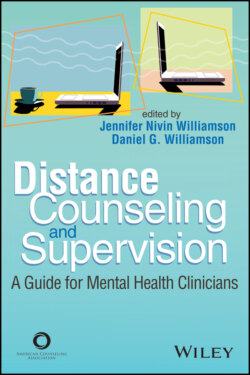Читать книгу Distance Counseling and Supervision - Группа авторов - Страница 38
Distance Supervision
ОглавлениеWhen engaging in supervisory relationships that involve the use of technology, counselor supervisors must hold supervision to the same standards as all other technology-assisted mental health services. In addition, telesupervision should be held to the same standards of appropriate practice as supervision conducted in an in-person setting (AMFTRB, 2016). Special attention should be given to the regulatory standards for the state in which both the supervisor and supervisee are licensed. Some states allow only a portion of supervision to be conducted via technology, and many that allow the use of technology only allow sessions that use HIPAA-compliant, synchronous videoconferencing software to count toward supervision hours. Text, phone, and chat may or may not be allowed, but in many instances they are ancillary forms of communication that do not count toward required supervisory hours.
ACA (2014) clearly states that supervisors maintain appropriate, meaningful, and respectful professional relationships with appropriate boundaries in both face-to-face and electronic formats. According to the ACA Code of Ethics, “When using technology in supervision, counselor supervisors are competent in the use of those technologies. Supervisors take the necessary precautions to protect the confidentiality of all information transmitted through any electronic means” (ACA, 2014, Standard F.2.c.). Jencius and Baltrinic (2016) described this as at least a two-step process beginning with (a) knowing how to use the technology and (b) applying it in clinical and supervisory practice. The authors explored the various ways in which counselor educators and supervisors use technology, including technologies such as bug-in-the-ear, bug-in-the-eye, audio and video recording, and synchronous videoconferencing, both as a means of connecting and also as a method of instruction. Jencius and Baltrinic further described synchronous videoconferencing as “using a new technology to provide an old supervision format instead of considering the unique opportunities that technology can provide” (p. 254). Nelson et al. (2010) noted that ethical practices are “fundamental to all clinical supervision regardless of supervision delivery modality” (p. 4).
As for pregraduation clinical experiences for counselors-in-training, Council for Accreditation of Counseling and Related Educational Programs standards do not specifically address the differences in how the standards should be applied to distance supervision versus face-to-face supervision. Students in distance supervision are held to the same standards as those in face-to-face scenarios, including weekly, real-time communication with a clinical faculty supervisor; evaluation of recorded sessions or live on-site supervision; and evaluation of counseling performance. These are often accomplished through a combination of video, audio, and text-based chat (Carlisle et al., 2017).
Supervisors should have some form of written informed consent in the supervisory relationship that includes the risks and responsibilities of using technology in online supervision. This is in addition to the information that would be included for face-to-face supervision (AMFTRB, 2016). This can be included in supervisory contracts, supervisor professional disclosure statements, or course syllabi. The informed consent should include discussion of the following:
The distance counseling and supervisory credentials of the instructor,
The risks and benefits of using computer-mediated communication in supervision,
What to do in case of technology failure,
Anticipated response time,
Emergency procedures,
Cultural differences,
Time zone differences, and
Potential denial of benefits for this service. (Jencius & Baltrinic, 2016, pp. 264–265)
In addition, Standard F.4.a. of the ACA Code of Ethics (ACA, 2014) stresses that supervisors identify the policies and procedures to which they adhere and the due process involved in appealing individual supervisor actions. Issues unique to the use of distance supervision should be included in the supervisor’s informed consent document.
